$1 SHIPPING on NEW Spring Releases 93+ Points (Ends 4/28, Use Code: BEST) | SHOP NOW

$1 SHIPPING on NEW Spring Releases 93+ Points (Ends 4/28, Use Code: BEST) | SHOP NOW

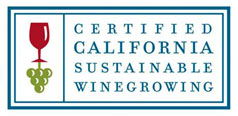 As a strong advocate of sustainable farming, Concannon was honored to help pioneer the development of the Wine Institute’s “Code of Sustainable Winegrowing Practices.” This collection of best practices establishes a set of sustainable standards for all California wineries that also ensures third-party verification and a cycle of continuous improvement.
As a strong advocate of sustainable farming, Concannon was honored to help pioneer the development of the Wine Institute’s “Code of Sustainable Winegrowing Practices.” This collection of best practices establishes a set of sustainable standards for all California wineries that also ensures third-party verification and a cycle of continuous improvement.
In 2009, Concannon participated in the CSWA “Certified Pilot Program” as one of the seventeen California wineries selected to test the certification requirements and offer feedback for introducing a statewide certification program.
On January 5, 2010, Concannon became one of the first 13 wineries to earn this rigorous certification by meeting a set of 58 prerequisites among 227 best management practices in environmental stewardship, conservation and socially equitable business standards.
Each year, Concannon must demonstrate sustainable practices; positive economic, environmental and social impact; and “continuous improvement” by third-party verification to maintain certification. As a founding member of the Wine Institute, Concannon is committed to encouraging sustainable winegrowing throughout California and helping change the way growers around the world think about their winegrowing and farming practices.
We employ locally-sourced compost to reintegrate organic matter into the soil. This practice establishes a vital reservoir of essential nutrients for the vines. It enhances nutrient retention and uptake by plants, fosters improved soil conditions conducive to robust root development and function, and fosters a microclimate that nurtures plant growth.
Our employment of natural cover crops serves multiple vital purposes. It prevents runoff and soil erosion during winter rains, while also maintaining loose and porous soils for robust root development. This approach increases organic matter, nutrient and water retention, and suppresses weed growth. Additionally, it improves air quality by reducing dust from routine vineyard activities.
Our adoption of minimal tillage practices increases the sustainability of our vineyard, reducing the cost to produce grapes. Minimum till soil management uses less energy, reduces dust, and increases the earthworm population, which naturally aerates the soil. Less tillage of the soil and leaves the soil biosphere undisturbed so things work together naturally.
Our comprehensive approach involves testing soils at 1-foot intervals up to a depth of 3 feet, offering valuable insights into soil health. Additionally, we conduct plant tissue analysis biannually, ensuring a holistic understanding of our vineyard’s condition. Our commitment to these analyses is the bedrock of our success. Thriving vines and fertile soils harmonize to yield consistently flavorful, well-balanced, and high-quality grapes, season after season.
Sustainable practices include using extreme efficiency in our irrigation methods — this saves water while improving vine quality:
We use pressure-compensated, drip line emitters on all vines ― these adjust automatically under varying pressures to distribute water evenly to each vine, greatly reducing water use.
We utilize an on-site evapo-transpiration sensor/monitoring system, to receive site-specific readings using a cell signal to a web-based database. Using this reading along with other vineyard-specific info, the Tule system helps pinpoint our precise irrigation needs per vineyard block on a daily basis. Because these sensors upload data to the internet, we can remotely monitor crop water status to manage our 220 estate acreage with less water, less labor and less time.
We have a full-time employee who monitors the irrigation system and fixes problems and leaks immediately as they arise. Our viticulture team uses technology and constant field observation to limit water use to precisely what is needed.
In 2015, we changed our barrel and tank sanitation methods. Now, we steam clean our barrels at 220°F for three minutes and follow with a quick rinse. Steaming does a great job, and we’ve gone from using 30 gallons of water per barrel to only 5 gallons. To clean large tanks, we’ve switched to a natural, environmentally-friendly compound that breaks down quickly and allows us to reduce rinse water from 150 gallons per tank to 50 gallons.
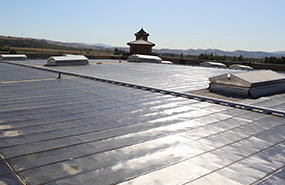 In 2009, we installed a 150 kilowatt solar panel system on the rooftop of our new, high-end, production facility, our state-of-the-art, small lot winery, and original winery and barrel room. These panels capture the sun’s heat for regulating the perfect temperature for the grapes and wines.
In 2009, we installed a 150 kilowatt solar panel system on the rooftop of our new, high-end, production facility, our state-of-the-art, small lot winery, and original winery and barrel room. These panels capture the sun’s heat for regulating the perfect temperature for the grapes and wines.
Control systems were selected for both sustainability and energy efficiency. Tanks are computer-controlled to ensure that unnecessary cooling capacity is not used. Energy efficient HVAC systems meet or exceed local standards.
Our winery, production facility, labs, barrel room, offices and break rooms have motion-sensor lights that automatically turn on when a door is opened and turn off with no movement. For outdoor lighting, we now use 80% less energy from having replaced our metal halogen lights with LED.
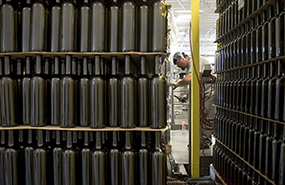 We’ve updated equipment with the latest in emission controls and fuel efficiency. Also, we now buy bottles in bulk instead of in cases. The bottles are delivered shrink-wrapped, and we assemble the cases on the bottling line. You can get more bottles on the truck that way, so it’s a more efficient way to get the glass to our facility – less traffic, less fuel and fewer emissions towards lowering our carbon footprint.
We’ve updated equipment with the latest in emission controls and fuel efficiency. Also, we now buy bottles in bulk instead of in cases. The bottles are delivered shrink-wrapped, and we assemble the cases on the bottling line. You can get more bottles on the truck that way, so it’s a more efficient way to get the glass to our facility – less traffic, less fuel and fewer emissions towards lowering our carbon footprint.
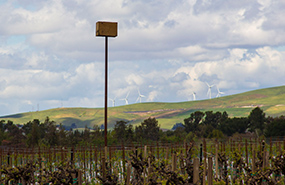 We use owl boxes and hawk perches to encourage a self-regulating ecosystem of natural predators for vineyard prey and pests. We take precautions to control vineyard pests such as squirrels, gophers, deer and birds with eco-friendly, natural, safe and organic methods to protect the environment while simultaneously protecting the grapes for harvesting.
We use owl boxes and hawk perches to encourage a self-regulating ecosystem of natural predators for vineyard prey and pests. We take precautions to control vineyard pests such as squirrels, gophers, deer and birds with eco-friendly, natural, safe and organic methods to protect the environment while simultaneously protecting the grapes for harvesting.
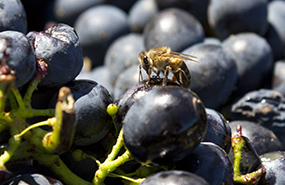 Throughout the estate, we provide plantings that attract beneficial bees and butterflies to promote pollination while giving them a protected place to thrive. We also plant for attracting hummingbirds and beneficial insects that help control unwanted vineyard pests.
Throughout the estate, we provide plantings that attract beneficial bees and butterflies to promote pollination while giving them a protected place to thrive. We also plant for attracting hummingbirds and beneficial insects that help control unwanted vineyard pests.
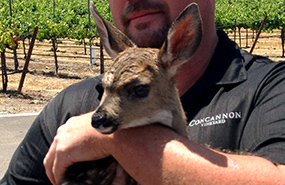 To promote the welfare of native wildlife species in the area and preserve water quality, we maintain safe strips of land for runoff protection and native vegetation along the estate’s Arroyo Mocho Creek. When we find injured animals or lost little ones, we work with animal protection to provide the care they need.
To promote the welfare of native wildlife species in the area and preserve water quality, we maintain safe strips of land for runoff protection and native vegetation along the estate’s Arroyo Mocho Creek. When we find injured animals or lost little ones, we work with animal protection to provide the care they need.
At Concannon, we operate a large recycling center with three large compactors representing two recycle containers and one solid waste container. We recycle all of our own glass, plastic and cardboard. This also avoids adding unnecessary waste to our local landfills. Prior to our own recycling, we had to pay a substantial amount to have these materials picked up. Since 2009, however, the money we earn from selling the materials pays for the recycling center — a net zero.
125,000 guests visit our estate winery each year, and all personal and picnic trash was going into the same barrel containers. Our tasting room manager, a member of our Concannon Green Team, is passionate about recycling and came up with a plan for setting out attractive, designated barrels for plastic, glass and paper. We started with our lawn area and have now set out recycling-specific barrels throughout the estate.

Sign up for exclusive offers and receive a welcome email with a promo code to save 20% on your first online order.